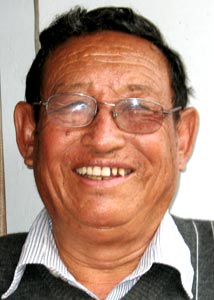Name: Wangyal
(Alias: No)
Gender: Male
Interview Age: 66
Date of Birth: 1941
Birthplace: Samada, Utsang, Tibet
Year Left Tibet: 1960
Profession: Agriculture, Dairy Farming
Monk/Nun: No
Political Prisoner: No

Interview No.: 63
Date: 2007-07-03
Language: Tibetan
Location: Lugsung Samdupling Settlement, Bylakuppe, Karnataka, India
Categories: Chinese Invasion and Occupation
Keywords: brutality/torture, childhood memories, Chinese -- first appearance of, Chinese rule -- life under, education, farm life, monasteries -- destruction of , refugee in India -- life as, thamzing/struggle sessions, Utsang
Summary:
Wangyal was born in Samada in the Gyangtse district. As a boy he operated the water mill for grinding barley grown on his grandparents' farm. They had many laborers working on their farm, who received wages and food for their work. Wangyal says that no one in his village was in need of work; the traditional relationship between landowners and laborers was beneficial to both.
Wangyal had been taught to read and write so when the Chinese occupied his region they assigned him the duty of recordkeeping at the Farmers' Commune Office, and later appointed him Secretary of the Commune Office. Wangyal speaks of Buddhist traditions and how the Chinese destroyed Tibetan religion and culture. He explains that the Chinese deceived the Tibetan people, acting nicely towards them and paying high prices for goods between 1951 and 1959. But Wangyal heard of sufferings inflicted by the Chinese in other parts of Tibet and was worried about the future.
Then in 1959 the Chinese began arresting and subjecting many influential people and lamas to thamzing 'struggle sessions.' His Holiness the Dalai Lama inspired Wangyal to write a book entitled Stories of Life Experiences in which he narrates the situation before and after the arrival of the Chinese in Tibet.
Interview Team:
- Marcella Adamski (Interviewer)
- Tenzin Yangchen (Interpreter)
- Tsewang Dorjee (Videographer)

